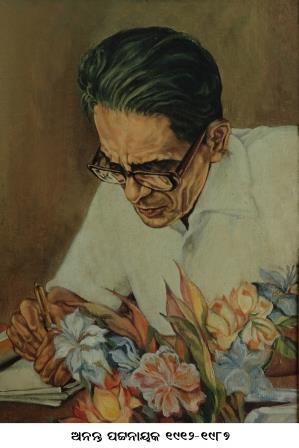Born :- 12-Jun-1912
Died :- 25-Jun-1987
Place of Birth :- Chatahantta, Puri

Ananta Narayana Pattanayak, popularly known as Ananta Pattanayak, a communist thinker and revolutionary poet, writer and translator who jumped headlong into a lifelong struggle to see a developed human society and a fuller social life, ignoring the attraction of wealth and pleasure, was born in the village of Chatahanga in undivided Puri district. His father's name was Jayakrushna and his mother was Mahadei.
Ananta Pattanayak's life was an exception in many respects compared to the lives of other Odia poets. In his youth, the poet plunged into the liberation struggle of India, dreaming of resurrection of the whole society. In his early youth, the Marxian and the Gandhian thoughts, over time, changed the course of his life. The conspiracy of the clever few in ruling over the innocent majority, the hypocrisy of the wealthy and the Brahmins in exploiting the credulous multitude in the name of religion made him a rebel. He joined hands with Bhagabaticharan Panigrahi, Gurucharan Pattanayak, Gokul Mohan Pattanayak, Malati Chowdhury and Nabakrushna Chowdhury with a view to working collectively to remove inequality in the society, and formed the ‘Nav yug Sahitya Samsad’. He never deviated from his commitment for liberation and literature till his last days. His revolutionary thought and activities and his commitment for the oppressed people are clearly reflected in his creations such as ‘Chhaira Chhita’, ‘Alodaloda’, ‘Arutu Rutu’, ‘Avantar’, ‘Kinchit’, ‘Shantishikha’, ‘Tarpan Kare Aji’, and in many essays, critiques, translated works and children’s literature. He wrote popular plays such as ‘Chiri Andhar Raati’, ‘Panchashil’ and ‘Ravana’. His translations from Sanskrit and Russian include: ‘Mruchhakatik’ (Shudrak), ‘Maa’ (Mother: Gorky), ‘Bhagyaru Khiye’ (Solokov), and ‘Shikshanabish (Gorky). He has authored many children's books, such as ‘Chhabitieku Gapatie’, ‘Lal Gulugulu Surajatie’, ‘Gitatie Rachita Hela Kipari’ and ‘Mo Chhabi Bahi’.
Ananta Pattanayak was the first editor of the monthly children's magazine Shishulekha, published by the government of Odisha. In 1954, he also wrote the screenplay, dialogue and songs for the fourth Odia film, ‘saptasajyara Kahani’. Besides, he acted as co-director of the film. During its production, he came in close contact with many of the most popular Bengali writers and film directors. In the same year he became the Vice President of the Utkal Loka Sanskruti Mandal, the Odisha branch of the Indian People’s Theatre Association (IPTA), comprising progressive artists.
From revolution to poetry, from poetry to music, drama, prose, children's literature etc., Ananta Pattanayak gradually established himself in all fields—service, teaching, editing, social work, and active politics. While he was a journalist in the Samaj, he started the legendary column ‘Jhitipiti Kahe’ and regularly wrote under the pseudonym ‘Anakar’. In the pen name of Sanjay, he was also writing a column in the daily Prajatantra.
Ananta Pattanayak attended the Afro-Asian Writers' Conference at Tashkent in 1958. As a translator, he joined the Soviet Information Department at Calcutta and was in charge of the Odia publication of the Soviet Desh magazine. Recognition and rewards came automatically to this poet of high self-esteem who always kept himself aloof from self-advertisement and self-adoration. In 1967 he was awarded the ‘Soviet Land Nehru Award’ for his translation of Gorky’s novel ‘Mother’. He was again awarded the ‘Soviet Land Nehru Award’ in 1982 for his total literary achievement, and was simultaneously rewarded with an opportunity to travel other countries. Pattanayak was also honoured with the Kendra Sahitya Academi Award and the Odisha Sahitya Academi Award. He was invited to participate in many national and international literary conferences.
